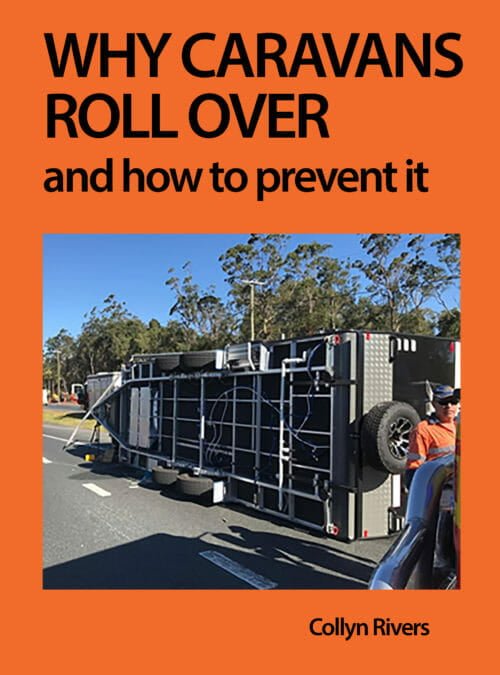by Collyn Rivers
Travel Trailer Suspension
Travel trailer suspension has requirements that are very different from tow vehicles. This is only too often misunderstood. Here’s why and what it should be.
Travel trailer suspension basics
Were roads totally smooth, there would be no need for sprung travel trailer suspension. Most roads, however, are far from that. Even trains on smooth rails need springing. Travel trailer wheels must traverse bumps, holes and sometimes corrugation. They must do so without damaging the travel trailer and that carried in it.
The suspension is speed-related. Road shocks forces increase by the square of the speed. For instance, such shocks at 60 km/h are four times harder than at 30 km/h. At 100 km/h it’s over ten times as hard.
The effects are more severe than many owners suspect.
![[cara_up] suspension - it is mostly misunderstood 1 Travel Trailer Suspension - jayco independent](https://rvbooks.com.au/wp-content/uploads/2014/09/suspension-jayco-independent.jpg)
Jayco independent travel trailer suspension
How hard and how often
At 60 km/h, a bump one metre wide is crossed in a sixteenth of a second. It is not a gentle rise and fall. The wheel and axle are belted upward, compressing the associated spring/s. The heavier the wheels, tyres and moving bits of suspension (relative to that sprung) the greater the shock energy.
Whatever the springing form, it acts as a strong bow. It momentarily stores energy. The instant a wheel has passed over the bump, that spring instantly releases its pent-up energy. This jackhammers that wheel, tyre and axle back down. Unless slowed, it smashes wheel and tyre onto the road. The impact forces are taken via its wheel studs. Over corrugation, this happens about 1300 times per kilometre. And, likewise, per wheel.
Sprung suspension must dampen that downward release. This is typically done by friction (thus turning it into heat).
Travel trailer suspension – energy damping the primary need
With leaf springs, as compressing spring leaves slide (slightly) between each other, friction is caused. This only happens, however on the axles upward travel. As compression suddenly releases, there is no friction to dampen that movement: the spring leaves are no longer pressed together.
Early carriage makers knew all this by 1800 or so. They understood that, if spring movement is damped by friction, spring energy is released as heat. By binding the leaves tightly with strong leather thongs they increased inter-leaf friction. (Some vintage car owners still do). Today’s crude upper clamp only vaguely holds the leaves together.
![[cara_up] suspension - it is mostly misunderstood 2 Travel Trailer Suspension. Carriage suspension old good](https://rvbooks.com.au/wp-content/uploads/2014/09/carriage-suspension-old-good.jpg)
Early carriage suspension was surprisingly sophisticated.
Less crude was the Hartford friction damper invented in 1895. This had partially rotating clamped friction disks. A later version had hydraulic action. Such methods helped. That specifically needed was to dampen downward movement more strongly than upward movement.
Coil springs and torsion bars made this essential. The solution, de Carbon’s telescopic hydraulic dampers, are used to this day.
Beam axle – or independent
The suspension needed for travel trailers is totally different from that for passenger cars. Travel trailers pivot about the tow ball. They readily absorb even major bumps by rocking. Long travel suspension is not required. It has long since ceased to be on all but off-road vehicles.
Nor do travel trailers benefit from independent suspension. It is used either unthinkingly – or for marketing reasons. Beam axle suspension has many advantages. For example, it provides a stable platform at all times. The wheels remain at right angles to the road at all time.
Leaf springs do not necessarily have to be used. Other forms of spring exist. A major issue, however, is a lack of well-engineered leaf spring systems for travel trailers. Long, parabolic leaf springs are just fine. If self-building use those from the rear for a Hilux.
Travel trailer suspension – little need for compromise
Human physiology passenger car suspension. That required for optimal road holding is too harsh for comfort. Humans, on the other hand, do not travel in travel trailers. There is thus no need to compromise. But travel trailer makers pointlessly ape the type of car suspension used in American cars of the mid-1930s. Passenger car suspension has since had less, but more controlled vertical travel.
Travel trailer suspension needs to be engineered to suit travel trailer needs!
(The effect on humans etc is covered in depth in my Travel trailer & Tow Vehicle Dynamics.)
All this was thoroughly known by the mid-1930s. Despite that, most travel trailer makers ignore it. Or not aware of it. Some products defy basic laws of physics. One example is friction sway damping: makers seem unaware that frictional forces remain constant but the forces they are expected to absorb increase with the square of the rig’s speed.
Travel trailer suspension – further information
I cover suspension in detail in Why Caravans Roll Over – and how to prevent it, and The Travel trailer & Motorhome Book. Camper trailer suspension, likewise in the Camper Trailer Book. My other books are Caravan & Motorhome Electrics, Solar That Really Works (for cabins and RVs). Solar Success is for homes and properties. See also Wheels Falling off Trailers.
This topic often arises on RVers forums. If you find this interesting please consider posting this Link in on related threads.




